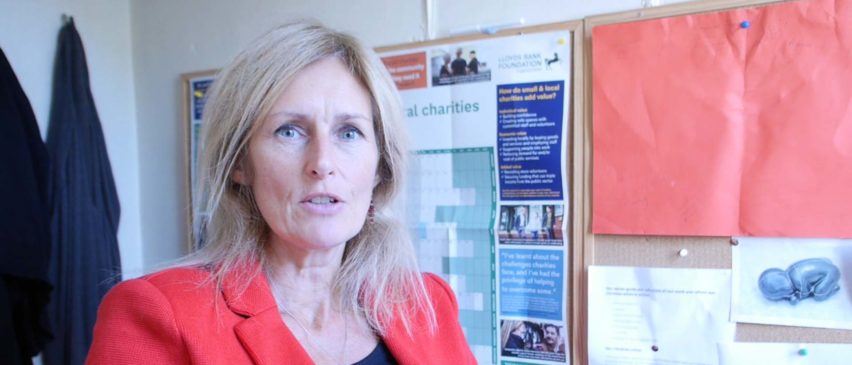

As the UK’s biggest service provider specifically for street sex workers, believe we have some important points to make. We know that street sex work in Bristol is a last resort for women. They face poverty, stigma, homelessness, domestic and sexual violence, addiction to drugs and/or alcohol and chronic ill health. The Prostitution inquiry has now finished taking written evidence and we’re eager to hear its report. But it’s important to our service users that we don’t use the term “prostitution” – they tell us that sex work is work.
There are many barriers which prevent One25 service users getting essentials like GPs, sexual health, drug treatment and housing services. But we know that with the right support, they can and do recover.
The women we work with are extremely vulnerable and hidden from view and so we welcome the inquiry’s focus on inequalities and harm. We at One25 want all services to work together to improve the response to the needs of women who street sex work. Our evidence focused on these three questions:
“The exclusion of these women is unmatched: even those working with homeless people rarely notice them” (Moss & King, 2012). Twelve times more likely to be murdered and 167 times more exposed to sexual violence (Salfati, 2009), they experience the harshest health and social inequalities of all excluded groups (Luchenski et al, Lancet 2018).
The violence that women face is often from multiple perpetrators and they are often not safe within their own community. They are at risk of ‘cuckooing‘ and high levels of coercion. Women can become totally isolated and increasingly hidden from public view.
Our most recent research into women who are street sex-working in Bristol shows the issues they face:
Women wanting to escape the streets can face multiple barriers to getting the help they need.
Trauma: usually undiagnosed, from both adverse childhood experiences and as adults
Co-dependency: many sex work to fund drug use of an abusive ‘partner’
Dual diagnosis: many addiction agencies won’t help those with poor mental health; many mental health services won’t work with addicts
Inflexible appointments: chaotic lives block access to mainstream service times and locations
Entrenched shame: stops them seeing professionals
Loss of tenancy in prison: causes women to be classified on release as “intentionally homeless” and ineligible for housing support.
Rock-bottom self-esteem: they can’t imagine change is possible
Current systems do not cater for these women.
One25 is unique in being without time boundaries or targets, working at a woman’s pace. We tailor activities to each woman, from a 5-minute visit to drop-in, to 6-hour support in court to give evidence against an abuser. Their complex needs mean it can take years to establish the relationships needed to recover. Women know they can return to us whenever they need us. Zena said:
“Not having time limitations when working with someone is amazing. It makes it easier for me to build trust and open up. With us girls things change so quickly and we need to have someone we can trust when things go wrong.”
Because of their extremely complex needs we know that women need support in ways that work for them. So we collaborate with more than 70 agencies so they get exactly what they need wherever they are in their recovery journey.
We represent women on 30 different strategy groups in and around Bristol and we push for systemic change to take their needs into account. Our model is based around helping them access the support that’s out there for them and advocating for help to be made available where there’s a gap.
Our relationship-building, multi-agency approach is widely evidenced as the most effective way to tackle complex need (Farmer review 2019; Home Office, 2011). Caseworkers build effective relationships with women, agencies and strategy groups. They also provide training to other professionals (e.g. police, prison staff, housing officers) to raise awareness, reduce stigma and improve access.
One25 trials innovative approaches to provide new ways of offering support which can meet their needs. For example, last year The University of Bristol and Bristol Drugs Project completed a ground-breaking NHS treatment trial in our drop-in space, offering parallel support for post-traumatic stress disorder and addiction. (The results will be published shortly.)
In 2019 we’ve been hugely encouraged by Dr Lucy Potter’s research into how vulnerable women can get access to healthcare. Her early findings show that One25’s healthcare is leading the UK. Women have responded brilliantly, collaborating to build feedback and training materials to create change in the NHS.
We welcome the inquiry into these issues because they’re affecting some of the most vulnerable people in our society. One25 recommends the following actions to reduce inequalities and harm for women facing street sex work:
We look forward to hearing from the Prostitution inquiry. We’re committed to being with each woman every step of the way. So we hope that the Women and Equalities Committee listen to what we know works for vulnerable women. Last year One25 helped 53 women to exit street sex work. This represents 40% of the 130 who were street sex-working. Yvonne told us:
“You supported me after my two rapes and during the court appearances. I would still be living in a tent now if it wasn’t for all your help. One25 is an amazing thing. I definitely wouldn’t be where I am now without the love, care and support you have given me.
Thank you all so very much.”
Please read more about our impact and the amazing achievements of the brave women we support.